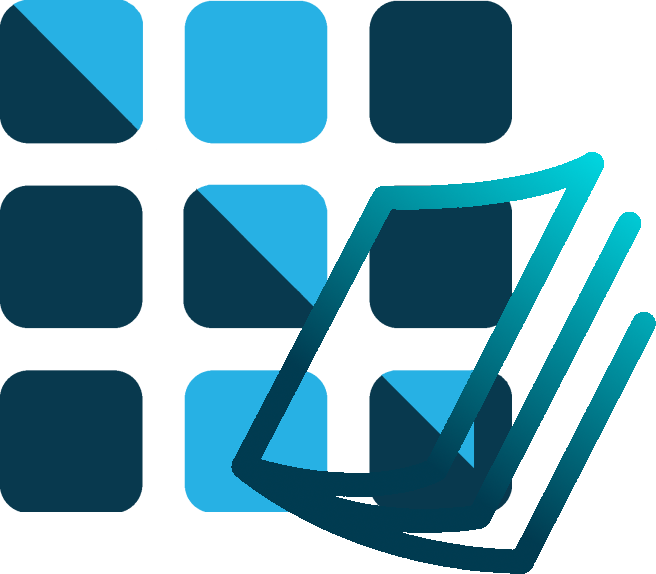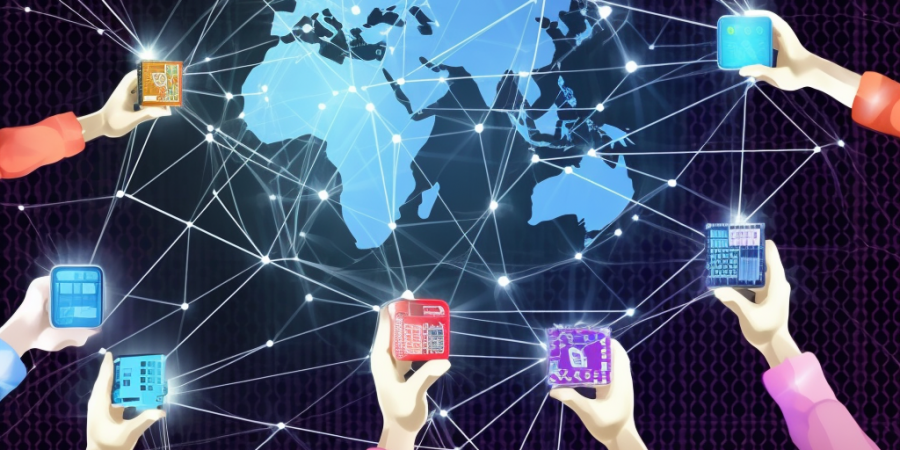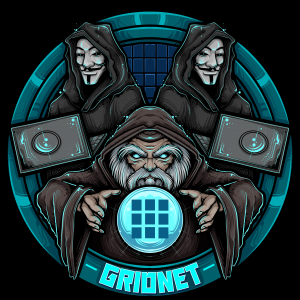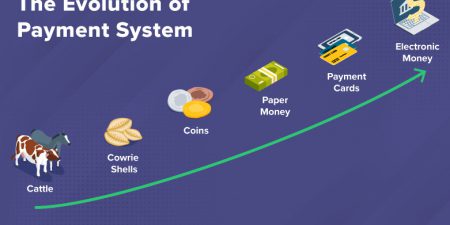Decentralized technology has the potential to bring together the East and West, the wealthy and the poor, and create a new economic system based on decentralized modern socialism powered by decentralized autonomous organization (DAO) technology. In this article, we will explore how decentralized technology can enable a more equitable and inclusive society, and how it can help bridge the gap between the East and West.
Decentralized technology refers to a system of organizing information and transactions that is not controlled by a single central authority. Instead, it is governed by a network of nodes that operate independently and autonomously. This system is based on blockchain technology, which uses a distributed ledger to record and verify transactions in a secure and transparent way. The decentralized nature of this technology makes it resistant to censorship, manipulation, and corruption, and allows for greater transparency and accountability.
One of the main benefits of decentralized technology is that it can enable a more equitable and inclusive economic system. In a centralized system, wealth and power are concentrated in the hands of a few individuals or institutions, leading to inequalities and injustices. Decentralized technology, on the other hand, can empower individuals and communities to take control of their own economic destinies, and share the benefits of economic growth more equally.
One example of how decentralized technology can promote economic inclusivity is through the use of decentralized finance (DeFi) platforms. These platforms enable anyone with an internet connection to access financial services such as lending, borrowing, and trading, without the need for intermediaries such as banks or financial institutions. This can be especially beneficial for people who do not have access to traditional financial services, such as those in developing countries or marginalized communities.
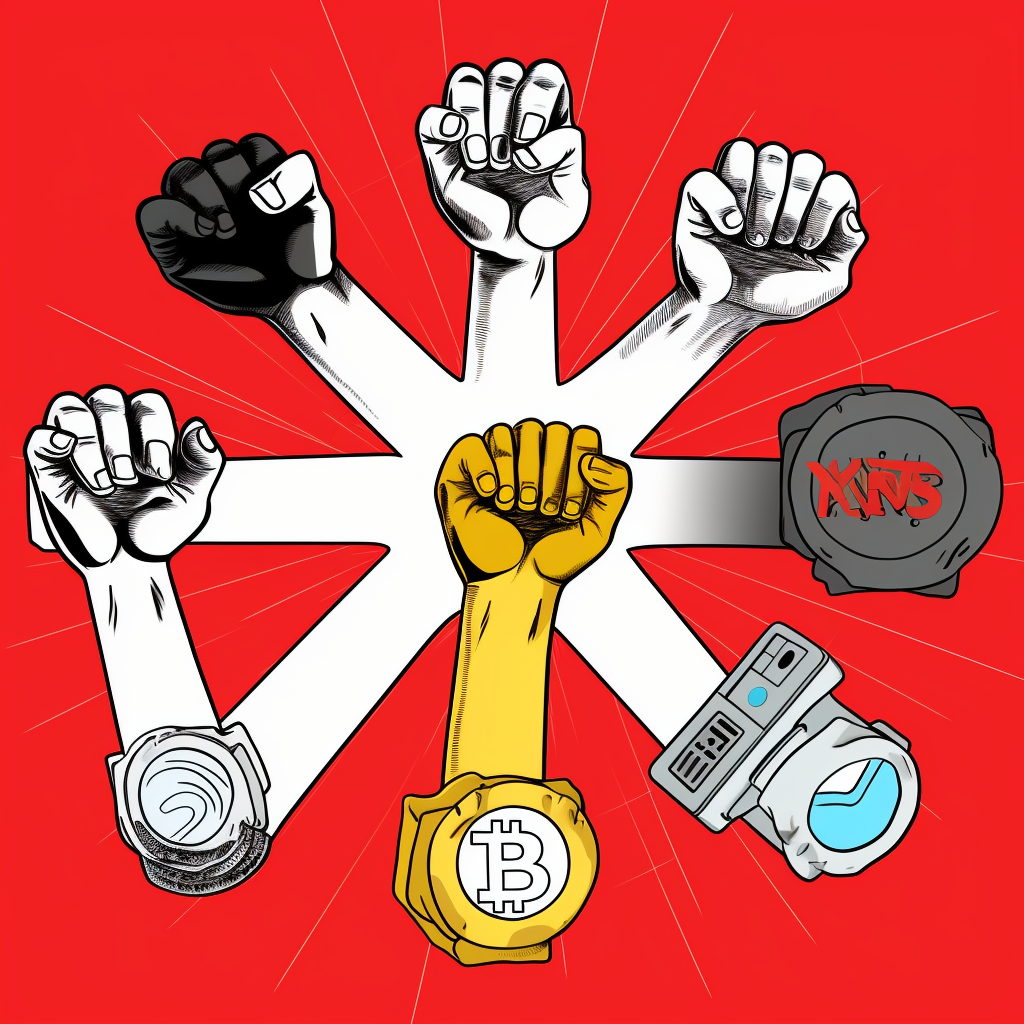
Wielding bits and bytes not hammers.
Decentralized technology can also help to bridge the gap between the East and West. In recent years, there has been a growing divide between the developed countries of the West and the developing countries of the East. This divide has been fueled by economic and political factors, as well as cultural and ideological differences. However, decentralized technology has the potential to create a new paradigm that transcends these divisions.
One way that decentralized technology can help bridge the gap between the East and West is by enabling greater economic cooperation and integration. Decentralized platforms such as blockchain networks can facilitate cross-border transactions and trade, without the need for intermediaries or central authorities. This can create new opportunities for economic growth and development, and promote greater collaboration and understanding between different cultures and societies.
Another way that decentralized technology can help to bridge the gap between the East and West is by promoting greater transparency and accountability in governance. Decentralized autonomous organizations (DAOs) are a new type of organization that are run entirely on blockchain technology, without the need for a central authority or board of directors. DAOs are governed by a set of rules and protocols that are encoded in smart contracts, which are self-executing and transparent.
DAOs can enable more democratic and participatory forms of governance, by allowing members to vote on proposals and make decisions collectively. This can help to overcome some of the cultural and ideological differences that have traditionally divided the East and West, by creating a more inclusive and consensus-based approach to decision-making.
Decentralized technology can also promote a new form of modern socialism, based on the principles of cooperation, community, and shared ownership. Modern socialism has traditionally been associated with state ownership and control of the means of production, but decentralized technology offers a new paradigm that is more decentralized, participatory, and democratic.
Decentralized autonomous organizations can enable new forms of collective ownership and management, where members have a direct stake and say in the operation of the organization. This can create new opportunities for cooperative and community-based enterprises, and promote a more equitable and sustainable form of economic development.
In addition, decentralized technology can enable new forms of social safety nets, based on decentralized and community-drive principles.
There have been previous attempts to implement socialism in the past, still – not much of it is around at the current times. Or is there ? Many European countries began implementing mixtures of socialism and capitalism long ago, – by introducing various kinds of state funded aids and subventions. Something that is oftentimes seen in common access to medical care, but also – obligatory retirement and insurance plans. Thus, should socialism remain a song of the past ?
Here it is worthwhile to notice that proponents of pure-capitalism (which luckily never was implemented) oftentimes like to call current implementations of socialism a ‘democratic socialism’. Still, it goes without saying that all the modern western economies have much more in common with capitalism rather than socialism. Here, at the head-start it is of paramount importance to indicate that decentralized socialism, i.e. the decentralized implementation of socialism as the name implies – does not involve state control. The ‘control’ is thus decentralized and in the grand scheme of things – lays in the hands of a global collective. Also, it is worth recalling that socialism, in itself, is not against free-markets or private property.
The troubles of prior implementations
The concepts and benefits of socialism have been debated and discussed for centuries, with proponents and critics alike offering arguments for and against its implementation. One of the major challenges that socialism has faced is the flow of information, and the accountability of signals related to supply and demand.
In a capitalist system, the flow of information is facilitated by markets, where buyers and sellers can freely exchange information about the availability and price of goods and services. This information is critical for determining the supply and demand for different products, and for setting prices that reflect the true value of these products.
In a socialist system, however, the flow of information is often centralized and controlled by the state. This can lead to inefficiencies and distortions in the market, as the state may not have access to accurate and timely information about the needs and preferences of consumers and producers.
Furthermore, the accountability of signals related to supply and demand is also a major challenge in socialist systems. In a capitalist system, prices serve as signals that communicate information about the availability and desirability of different goods and services. These prices are determined by the interaction of buyers and sellers in a decentralized market, and reflect the true value of these products.
In a socialist system, however, prices may be set by the state or a central planning authority. This can lead to distortions in the market, as prices may not reflect the true value of different products, and may not accurately communicate information about supply and demand.
The lack of accurate information and accountability in socialist systems can lead to inefficiencies, shortages, and surpluses, which can ultimately undermine the success of the system. For example, in the Soviet Union, the central planning authorities often overestimated the demand for certain products, leading to shortages of these products in the market. At the same time, they underestimated the demand for other products, leading to surpluses that went unused.
These inefficiencies and distortions in the market can lead to a loss of productivity and economic growth, and ultimately undermine the success of socialism as a system. Despite the best intentions of socialist leaders and planners, the lack of accurate information and accountability has been a major factor preventing the full realization and implementation of socialist principles.
Even still, decentralized technology offers a new paradigm that can help overcome these challenges and enable a more efficient and equitable form of socialism. Decentralized autonomous organizations, as mentioned earlier, can enable a more democratic and participatory form of governance, where members have a direct stake and say in the operation of the organization. This can help to overcome some of the inefficiencies and distortions in the market, by creating a more inclusive and consensus-based approach to decision-making.
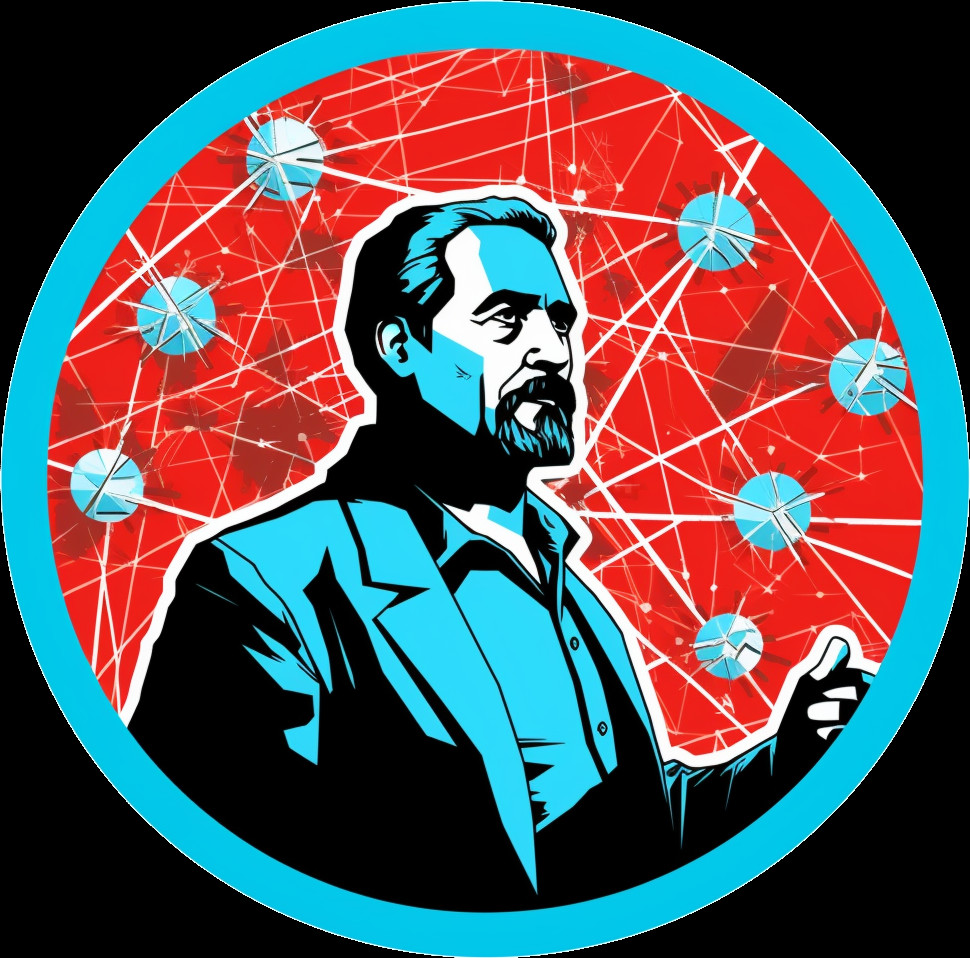
Would Karl Marx employ new technologies?
In addition, decentralized technology can enable greater transparency and accountability in the flow of information and signals related to supply and demand. Blockchain technology, for example, can enable a transparent and tamper-proof ledger of transactions, which can help to ensure that information is accurate and reliable. Smart contracts, which are self-executing and transparent, can also help to ensure that signals related to supply and demand are accountable and reflect the true value of different products.
Decentralized finance platforms can also help to promote greater efficiency and transparency in the market, by enabling anyone with an internet connection to access financial services and participate in the market. This can create new opportunities for economic growth and development, and promote greater accountability and transparency in the market.
The challenges with the flow of information and the accountability of signals related to supply and demand have been major factors preventing the concepts and benefits of socialism from ever being fully realized and implemented. However, decentralized technology offers a new paradigm that can help to overcome these challenges and enable a more efficient and equitable form of socialism. By promoting greater transparency, accountability, and inclusivity, decentralized technology can help to create a more equitable and sustainable economic system, and bridge the gap between the east and the west, as well as between the wealthy and the poor.
Decentralized technology has the potential to bring together the east and the west by creating a more open and transparent global economy. In the current global economic system, there are often unequal power dynamics between developed and developing countries, with the former holding a disproportionate amount of economic power and influence.
With the advent of decentralized technology, anyone with an internet connection can participate in the global economy, regardless of their geographic location or economic status. This can create new opportunities for economic growth and development, and help to level the playing field between different countries and regions.
Taking accessibility to financial instruments on the table, decentralized technology can help to bridge the gap between the wealthy and the poor, by creating new opportunities for financial inclusion and economic empowerment. In many parts of the world, there are large populations of people who are unbanked or underbanked, and who lack access to traditional financial services.
Decentralized finance platforms, however, can enable anyone with an internet connection to access financial services, including savings, loans, and investment opportunities. This can create new opportunities for economic growth and development, and help to empower marginalized communities and individuals.
Decentralized technology can also help to promote greater equity and fairness in the distribution of wealth and resources. By enabling more democratic and participatory forms of governance, decentralized autonomous organizations can help to ensure that decisions are made in the best interests of all members, and not just a select few.
What is more, by promoting greater transparency and accountability in the market, decentralized technology can help to prevent the concentration of wealth and power in the hands of a few individuals or organizations. This can create a more level playing field, where all participants have an equal opportunity to succeed and thrive.
Decentralized modern socialism, powered by decentralized autonomous organization technology, can offer a new vision for a more equitable and sustainable economic system. By promoting greater transparency, accountability, and inclusivity, decentralized technology can help to create a more democratic and participatory form of governance, where decisions are made in the best interests of all members.
Going further along with this idea, by promoting greater equity and fairness in the distribution of wealth and resources, decentralized technology can help to create a more just and compassionate society, where everyone has the opportunity to thrive and succeed.
Now, it is important to recognize that the implementation of decentralized modern socialism is not without its challenges. As with any major shift in economic and political systems, there are likely to be resistance and pushback from those who benefit from the current system.
There is a risk that decentralized technology could be co-opted by powerful actors, and used to further consolidate wealth and power in the hands of a few. It is important, therefore, to remain vigilant and to continue to promote greater transparency, accountability, and inclusivity in the development and implementation of decentralized technology.
Decentralized technology offers a new paradigm that can help to overcome the challenges that have historically prevented the full realization and implementation of socialist principles. By promoting greater transparency, accountability, and inclusivity, decentralized technology can help to create a more equitable and sustainable economic system, and bridge the gap between the east and the west, as well as between the wealthy and the poor. Decentralized modern socialism, powered by decentralized autonomous organization technology, offers a new vision for a more just and compassionate society, where everyone has the opportunity to thrive and succeed.
What Socialism tried to achieve.
Socialism is a political and economic theory that seeks to promote greater economic and social equality by advocating for collective ownership and control of the means of production and distribution of goods and services.
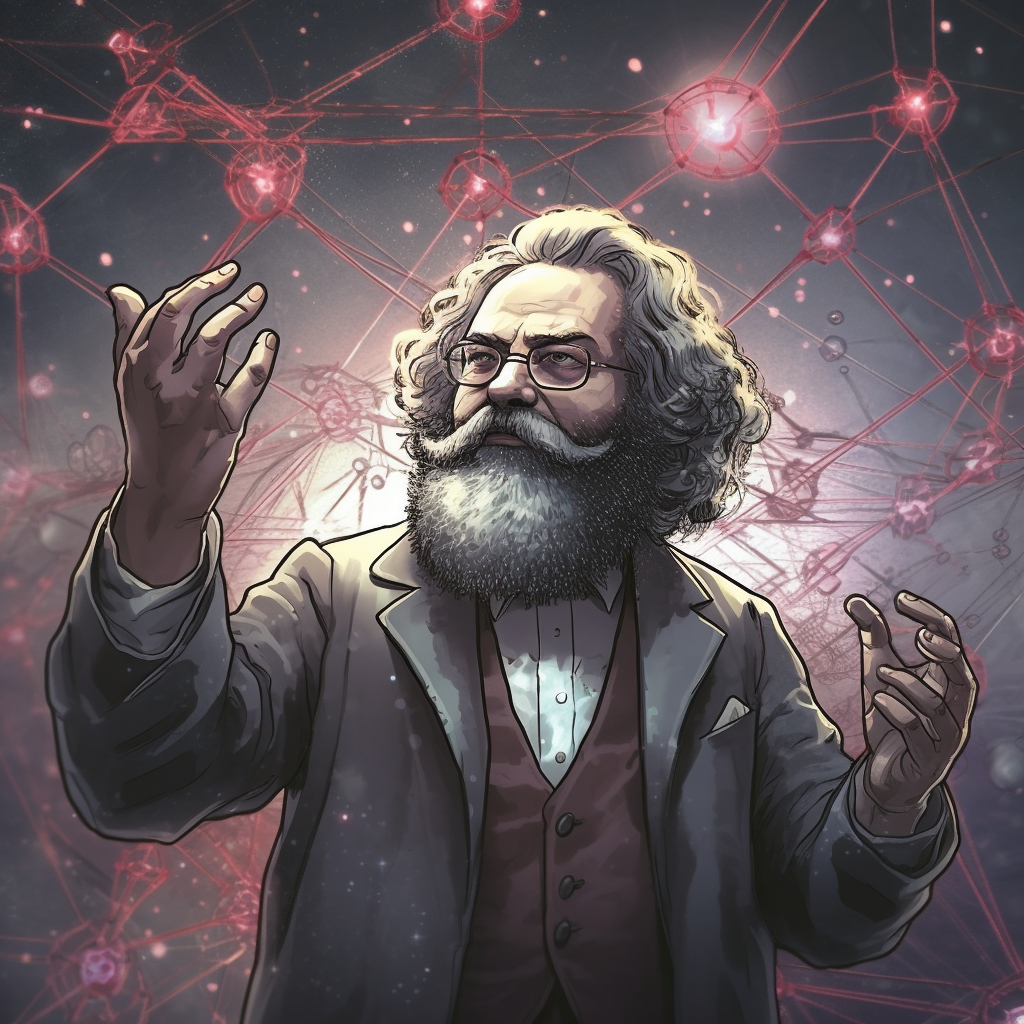
Something tells us he would rather admire the possibilities..
At its core, socialism is based on the idea that the fruits of economic activity should be shared more fairly among all members of society, rather than being concentrated in the hands of a few individuals or organizations. It seeks to promote greater social justice, reduce inequality, and ensure that everyone has access to the basic necessities of life.
Socialism has its roots in the industrial revolution of the 19th century, which brought about significant changes to the way that goods and services were produced and distributed. At that time, many people were working in factories under difficult conditions, while a small group of wealthy individuals controlled the means of production and amassed enormous wealth and power.
Socialists saw this as a fundamental injustice and argued that the solution was to promote greater collective ownership and control of the means of production. They believed that this would help to create a more equitable and just society, where everyone had access to the fruits of economic activity and could participate more fully in the democratic process.
Over the years, different forms of socialism have emerged, ranging from democratic socialism to Marxist-Leninist communism. While there are many differences between these different forms of socialism, they all share a commitment to promoting greater social justice and equality.
One of the key goals of socialism is to ensure that everyone has access to the basic necessities of life, such as food, housing, healthcare, and education. Socialists argue that these basic needs should not be subject to the whims of the market, but rather should be guaranteed as a basic human right.
When it comes to personal tastes, socialists believe that economic activity should be organized in a way that promotes the common good, rather than the narrow interests of a few individuals or organizations. They argue that this can be achieved through collective ownership and control of the means of production, which can help to promote greater democratic decision-making and ensure that economic activity is carried out in the best interests of all members of society.
That leads us to a conclusion that socialism seeks to create a more equitable and just society, where everyone has access to the basic necessities of life and can participate more fully in the democratic process. While there have been many attempts to implement socialist principles in different parts of the world, these efforts have often been met with significant challenges and resistance. However, with the advent of decentralized technology, there is renewed hope that these principles can be realized in a more effective and sustainable way.
Despite the goals and ideals of socialism, the reality of its implementation has often fallen short. One of the major challenges has been the difficulty of coordinating economic activity in a way that promotes efficiency, innovation, and responsiveness to changes in supply and demand.
Under traditional socialist models, economic decision-making was centralized in the hands of a small group of planners, who were responsible for setting production quotas, determining prices, and allocating resources. This top-down approach often resulted in inefficiencies, as planners struggled to accurately assess consumer demand and adjust production accordingly. As a result, there were often shortages of goods and services, as well as surpluses of others, leading to imbalances in the economy.
Another challenge with socialism was the lack of accountability and transparency in the economic decision-making process. Because economic activity was centralized in the hands of a few individuals, it was often difficult for citizens to hold their leaders accountable for their decisions. This lack of accountability contributed to a sense of disillusionment and mistrust among the population, which ultimately undermined the legitimacy of socialist regimes. Socialism has often struggled to keep pace with the rapid changes brought about by technological innovation. The traditional socialist model was built around a set of assumptions about how the economy worked that were based on 19th-century technologies and modes of production. As a result, socialist economies often struggled to adapt to new technologies and were slow to innovate.
The advent of decentralized technology, however, offers a potential solution to many of the challenges that have plagued traditional socialist models. Decentralized technology, such as blockchain and decentralized autonomous organizations (DAOs), provides a new way of organizing economic activity that is more transparent, democratic, and responsive to changes in supply and demand.
From a technical perspective, decentralized technology is based on the principles of decentralization and peer-to-peer networking. Rather than relying on a central authority to coordinate economic activity, decentralized networks use a distributed system of nodes to validate transactions and maintain a shared ledger of information. This system is designed to be transparent, immutable, and resistant to manipulation or censorship.
It is worth to underline that decentralized technology offers a new way of organizing economic activity that is more democratic and participatory. Decentralized autonomous organizations (DAOs) are a type of organization that is governed by smart contracts, which are self-executing agreements that operate according to pre-determined rules. DAOs are designed to be more democratic than traditional organizations, as decisions are made through a decentralized voting process that is open to all members.
It goes without saying that decentralized technology provides a new way of coordinating economic activity that is more responsive to changes in supply and demand. By creating a more transparent and decentralized system of information, decentralized technology can help to ensure that signals related to supply and demand are more accurate and reliable. This, in turn, can help to promote greater efficiency and innovation, as economic activity is better aligned with consumer needs and preferences.
The potential of decentralized technology to promote greater economic and social equality represents a new form of socialism that is more compatible with the realities of the 21st century. Decentralized modern socialism powered by decentralized autonomous organization technology can help to address the shortcomings of traditional socialist models by providing a more transparent, democratic, and responsive system of economic coordination. By leveraging the power of decentralized technology, it is possible to create a more equitable and just society that promotes the common good, rather than the narrow interests of a few individuals or organizations.
In order to better understand how decentralized technology could bring together the East and West and bridge the gap between the wealthy and the poor, it is important to look at some specific examples of how this technology can be applied in practice.
One potential application of decentralized technology is in the field of microfinance. Microfinance is a type of financial service that provides small loans to individuals or groups who do not have access to traditional banking services. These loans are often used to start or grow small businesses, which can help to lift people out of poverty and promote economic development.
In terms of universality, decentralized technology can be used to create a more transparent and efficient system of microfinance. For example, blockchain technology can be used to create a tamper-proof ledger of all microfinance transactions, which can help to prevent fraud and corruption. In addition, decentralized autonomous organizations can be used to create more democratic and participatory microfinance institutions, which can help to ensure that decisions are made in the best interests of the borrowers.
Another potential application of decentralized technology is in the field of supply chain management. Supply chains are the networks of organizations, people, and activities involved in the creation and delivery of a product or service. Managing these complex networks can be challenging, particularly in industries where there are many different suppliers and intermediaries involved.
Once we arrive at supply chain management, blockchain technology can be used to create a shared ledger of information about the various stages of the supply chain, which can help to ensure that all participants have access to accurate and up-to-date information. This can help to prevent fraud and reduce waste, as well as promote greater efficiency and innovation in the supply chain.
It quickly becomes evident that decentralized technology can also be used to create more democratic and participatory forms of governance. Decentralized autonomous organizations can be used to create new models of democratic decision-making that are more transparent, accountable, and responsive to the needs and concerns of citizens.
For example, a decentralized autonomous organization could be used to create a platform for collective decision-making on issues related to public goods, such as healthcare or education. This platform could be designed to allow citizens to propose and vote on policy proposals, as well as provide feedback on existing policies. By creating a more democratic and participatory system of governance, decentralized technology can help to promote greater social and economic equality.
Taking all of the above into consideration, the potential of decentralized technology to bring together the East and West, as well as bridge the gap between the wealthy and the poor, represents a new and promising vision of socialism for the 21st century. By leveraging the power of decentralized autonomous organizations, blockchain technology, and other forms of decentralized technology, it is possible to create a more transparent, democratic, and responsive system of economic coordination that promotes the common good. Whether applied to microfinance, supply chain management, or governance, decentralized technology offers a new way of organizing economic and social activity that has the potential to transform our world for the better.
In any case, it is important to note that the implementation of decentralized technology is not a silver bullet solution to all the problems of socialism. There are still many challenges and potential pitfalls to be navigated in order to ensure that these technologies are used in ways that promote the common good.
One challenge is ensuring that the benefits of decentralized technology are distributed in a fair and equitable manner. For example, in the case of microfinance, there is a risk that the most technologically savvy or well-connected borrowers could receive an unfair advantage over others. It is therefore important to ensure that the benefits of these technologies are distributed in a way that promotes greater equality and social justice.
Another challenge is ensuring that decentralized technology is used in a way that respects the rights and dignity of all individuals. For example, there is a risk that the increased transparency of decentralized systems could lead to greater surveillance and control over people’s lives. It is therefore important to ensure that these technologies are used in ways that respect privacy, freedom of expression, and other basic human rights.
Some may say that there is a risk that decentralized technology could be used to reinforce existing power structures, rather than promote greater equality and social justice. For example, in the case of governance, there is a risk that the most powerful and well-funded organizations could dominate the decision-making process, while less powerful groups are left out. It is therefore important to ensure that decentralized technology is used in ways that promote greater democracy and participation, rather than simply reinforcing existing power structures.
Despite these challenges, the potential benefits of decentralized technology for promoting greater social and economic equality are significant. By harnessing the power of these technologies, it is possible to create new models of economic coordination and social organization that are more democratic, participatory, and responsive to the needs and concerns of all people. Whether applied in the context of microfinance, supply chain management, or governance, decentralized technology offers a powerful new tool for promoting the common good and building a more just and equitable world.
Sybil-proof algorithms come to avail
One of the key challenges of using decentralized technology in the context of social and economic coordination is how to ensure that decisions are made in a way that is fair, transparent, and inclusive. In a centralized system, decisions are typically made by a small group of people who hold significant power and influence. This can lead to decisions that are biased, non-representative, and unresponsive to the needs and concerns of the broader community.
Decentralized technology offers a potential solution to this problem by allowing for more democratic and participatory decision-making. One way to achieve this is through the use of majority voting, which allows decisions to be made based on the preferences of the majority of participants. However, in an open and untrusted environment, there is a risk that bad actors could manipulate the voting process by creating multiple identities or “Sybils”.
To address this problem, decentralized networks could use the concept of a “stake” to ensure Sybil-proof voting. In this system, participants would need to demonstrate that they have a stake in the network in order to participate in the voting process. This stake could take the form of a financial investment or other type of commitment to the network.
By requiring a stake, decentralized networks can ensure that participants have a vested interest in the success of the network and are therefore less likely to engage in malicious behavior. In addition, by tying voting power to stake, decentralized networks can ensure that decisions are made in a way that is representative of the interests and preferences of the broader community.
When it comes to stakes, it is important to note that the use of a stake alone is not sufficient to ensure fair and democratic decision-making. It is also important to ensure that voting processes are transparent, auditable, and accessible to all participants. In addition, it is important to ensure that decision-making processes are designed in a way that promotes the common good, rather than simply reinforcing existing power structures.
It would be difficult to deny that the use of majority voting and stake-based systems in decentralized networks offers a promising approach to promoting more democratic and inclusive decision-making. By leveraging the power of decentralized technology, it is possible to create new models of economic coordination and social organization that are more responsive to the needs and concerns of all people.
Recall that as pary of our research we came up with the very first Sybil-proof data-exchange algorithm which has been proven to hold valid for computer networks of arbitrary topology, research article available over here.
Effective implementation of socialism
The use of decentralized technology, including majority voting and stake-based systems, has the potential to enable novel and effective implementations of socialism. Decentralized autonomous organization (DAO) technology, in particular, allows for the creation of decentralized communities that can govern themselves through consensus-based decision-making. This technology can be used to create social and economic networks that are owned and controlled by their participants, rather than by a centralized authority.
One possible implementation of decentralized socialism using DAO technology is through the creation of decentralized cooperatives. Cooperatives are organizations that are owned and controlled by their members, who share in the profits and decision-making processes of the organization. Decentralized cooperatives built on DAO technology could allow for the creation of democratic, self-governing communities that are more responsive to the needs and concerns of their members.
Another possible implementation is through the use of decentralized finance (DeFi) systems. DeFi allows for the creation of decentralized financial networks that are owned and controlled by their participants. These networks can be used to create new models of economic organization that prioritize the common good over individual profit. For example, DeFi systems could be used to create decentralized lending networks that prioritize lending to socially and environmentally responsible projects.
Decentralized technology also has the potential to promote greater economic and social equality. By removing the need for centralized authorities to mediate economic transactions, decentralized networks can reduce the power and influence of large corporations and financial institutions. This can help to level the playing field for smaller and less well-resourced organizations and individuals, promoting greater economic and social equality.
Decentralized technology can enable greater transparency and accountability in decision-making processes. By allowing for more democratic and participatory decision-making, decentralized networks can ensure that decisions are made in a way that is fair and representative of the interests and preferences of the broader community. This can help to reduce corruption and promote greater accountability in social and economic systems. The use of decentralized technology offers a powerful new tool for promoting greater social and economic equality through the implementation of novel and effective forms of socialism. By harnessing the power of DAO technology, decentralized cooperatives, DeFi systems, and other decentralized networks, it is possible to create new models of economic coordination and social organization that prioritize the common good over individual profit and promote greater democracy, participation, and accountability.
Things Karl Marx had not heard of..
Decentralized socialism is made possible by cutting-edge decentralized technology that was not available during Karl Marx’s time. Marx’s vision of socialism was based on a centralized state that controlled the means of production and distribution. However, advances in decentralized technology, such as blockchain and DAOs, offer a new way to realize the goals of socialism.
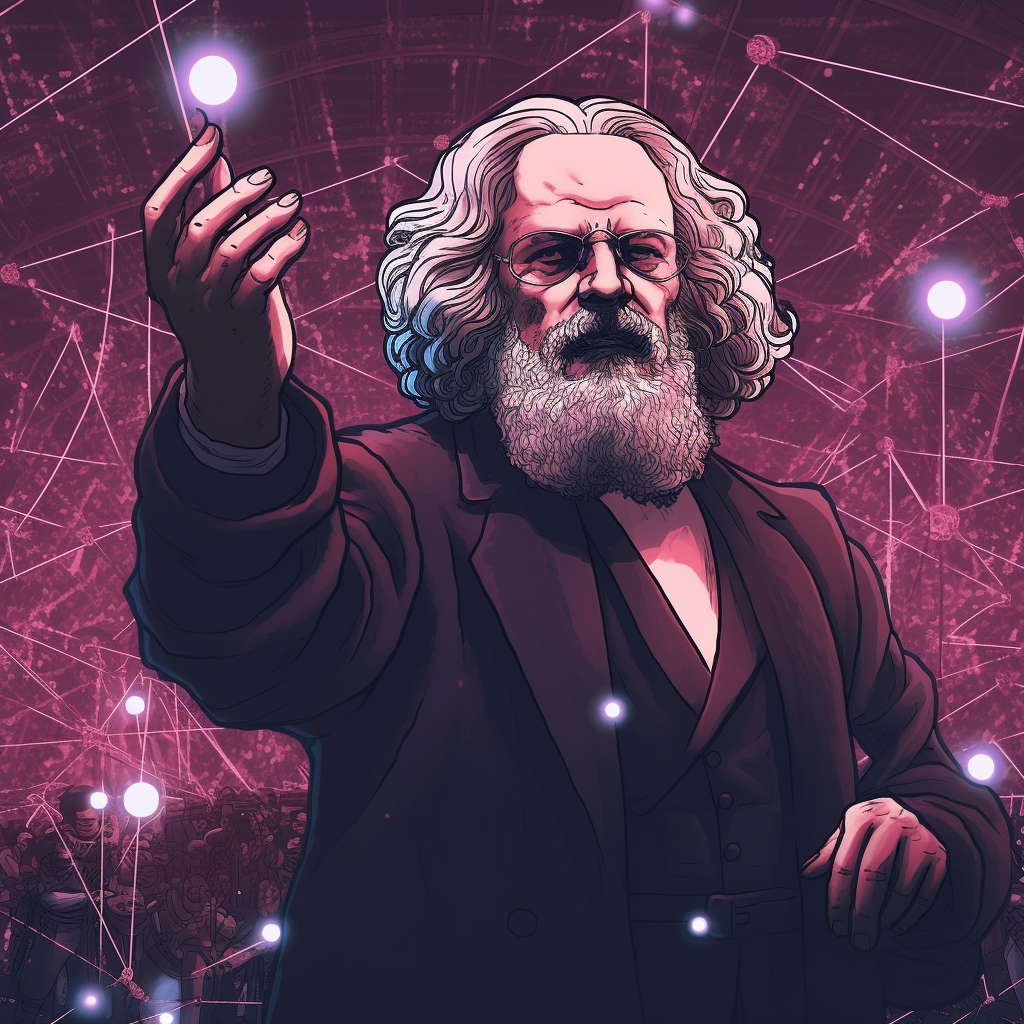
Would he like it though?
Decentralized technology enables the creation of self-governing communities that can coordinate social and economic activity in a way that is democratic, transparent, and accountable. This technology allows individuals to collectively own and control resources, rather than relying on centralized authorities. This shift in power allows for a more decentralized and egalitarian form of socialism. The technology can also address some of the issues that Marx identified as problems in the capitalist system, such as the concentration of wealth and power in the hands of a few. Decentralized networks can help to break down power structures and enable greater participation and representation in decision-making processes.
In addition, decentralized technology can help to address some of the practical challenges of implementing socialism. One of the key challenges of centralized socialism is the problem of information flow and accountability, which can lead to inefficiencies and corruption. Decentralized networks, on the other hand, can enable more transparent and accountable decision-making processes, reducing the risk of corruption and inefficiency.
Then, decentralized technology can enable greater innovation and experimentation in social and economic organization. Traditional socialist systems were often criticized for being inflexible and unable to adapt to changing circumstances. Decentralized networks, on the other hand, can enable more experimentation and innovation, allowing for the development of new models of economic coordination and social organization that better meet the needs of the community. The use of cutting-edge decentralized technology offers a new way to realize the goals of socialism. By enabling self-governing communities that prioritize democratic decision-making, transparency, and accountability, decentralized technology can promote greater equality, reduce concentration of power and wealth, and enable more innovation and experimentation in social and economic organization.
Decentralized technology also provides new tools for addressing some of the environmental and social challenges that Marx could not have foreseen. Climate change, for example, poses a significant threat to the sustainability of human society and the planet as a whole. Decentralized technology can enable the creation of new economic and social models that prioritize environmental sustainability and the common good.
For example, DAO technology could be used to create decentralized carbon markets, where individuals and organizations could trade carbon credits in a transparent and accountable way. Decentralized networks could also be used to promote renewable energy and other environmentally sustainable practices, enabling the transition to a more sustainable and equitable economic system.
In addition, decentralized technology can enable greater social cohesion and cooperation across cultural and national boundaries. The rise of globalization has brought many benefits, but it has also led to increased competition and division between different groups. Decentralized networks can help to promote greater cooperation and mutual benefit, enabling individuals and communities to work together towards common goals. Decentralized networks could be used to create cross-cultural and cross-national communities that are based on shared values and goals, rather than on geographic or political boundaries. These communities could work together to address global challenges, such as climate change, poverty, and inequality, in a way that prioritizes the common good over individual interests.
Thanks to new technology achievements we may have arrived at a new way to realize the goals of socialism, by enabling self-governing communities that prioritize democratic decision-making, transparency, and accountability. By promoting greater equality, reducing the concentration of power and wealth, enabling more innovation and experimentation, addressing environmental and social challenges, and promoting greater social cohesion and cooperation, decentralized technology offers a powerful new tool for building a more equitable and sustainable world.
Why socialism gained traction in the first place
The ideas of socialism gained traction in the past due to the economic and social conditions of the time. In the 19th and early 20th centuries, rapid industrialization and urbanization led to growing inequality, poverty, and social unrest. The concentration of wealth and power in the hands of a few industrialists and capitalists was seen as a major source of social and economic injustice.
In this context, the ideas of socialism offered a compelling vision of a more just and equitable society. Socialism emphasized the need for collective ownership and control of the means of production, with the goal of eliminating exploitation and promoting the common good. It also emphasized the importance of social solidarity and the need to prioritize the well-being of the community over individual interests.
Socialism gained particular traction among working-class and marginalized communities, who saw it as a way to challenge the power structures that were keeping them in poverty and exploitation. Socialist movements and parties emerged in many countries, and many labor unions and worker cooperatives were established with socialist principles.
Moreover, socialist ideas were often associated with broader movements for social justice and political reform, such as the fight for workers’ rights, women’s suffrage, and civil rights. Socialist thinkers such as Marx, Engels, and Lenin also had a profound influence on the development of political and intellectual movements across the globe.
Despite the many criticisms and challenges faced by socialist systems over the years, the basic principles of socialism continue to resonate with many people around the world. The ongoing struggles against economic inequality, social injustice, and environmental degradation are all examples of the continuing relevance of socialist ideas.
In recent years, the rise of new technologies and the emergence of decentralized networks have opened up new possibilities for realizing the goals of socialism. These new technologies offer a way to build self-governing communities that prioritize democratic decision-making, transparency, and accountability. They also provide new tools for addressing the social and environmental challenges of our time.
To sum up the overall reasons, the ideas of socialism gained traction in the past due to the economic and social conditions of the time. The principles of collective ownership and control, social solidarity, and the common good continue to inspire many people today, and new technologies offer new ways to realize these goals.
The failure of pure capitalism
With the title of this paragraph being rather radical, the truth is – as has been deliberately stated in the preface – neither capitalism nor socialism ever were implemented in their most radical forms. Still, it is widely proclaimed that western economies have much more in common with capitalism rather then socialism.
Democratic socialism is a political philosophy that emphasizes the need for socialism to be implemented through democratic means, such as elections and referendums. It is an extension of traditional socialism that emphasizes the need for democratic decision-making processes in order to ensure that the needs of the people are met.
Decentralized modern socialism, powered by decentralized autonomous organization technology, shares many of the same goals as democratic socialism. Both aim to create a society where the needs of the people are met, and where economic and political power is distributed more evenly.
However, there are some differences between the two philosophies. Democratic socialism tends to emphasize the role of the state in creating a more equal society, while decentralized modern socialism places greater emphasis on decentralized decision-making and the use of technology to create more democratic structures.
In practice, these two philosophies are not necessarily mutually exclusive. It is possible to envision a society where decentralized decision-making and the use of technology are combined with strong state institutions to create a more just and equal society.
The failure of ‘pure capitalism’ to ensure a satisfactory quality of life for everyone is a complex issue with many dimensions. One of the key problems with pure capitalism is that it tends to concentrate wealth and power in the hands of a few, while leaving many others behind. This can lead to growing inequality, poverty, and social unrest.
One way to see this is through the eyes of modern peasants working in factories. Many people in developing countries are forced to work long hours in difficult and often dangerous conditions, for very low wages. They have little job security or protection, and often live in crowded and unsanitary conditions. This is a direct result of the pursuit of profit by companies that seek to minimize labor costs and maximize returns for their shareholders.
At the same time, the concentration of wealth and power in the hands of a few can lead to a lack of investment in social services and infrastructure that are essential for ensuring a good quality of life for everyone. In some countries, public services such as healthcare, education, and transportation are inadequate or even non-existent, leaving many people without access to basic necessities.

On the other hand, the construction of artificial islands with six-star hotels in the East is a reflection of the excesses of pure capitalism. In some parts of the world, a small elite enjoys incredible wealth and luxury, while many others struggle to make ends meet. This is a direct result of the concentration of wealth and power in the hands of a few, who use their resources to accumulate even more wealth and power, often at the expense of others.
We may say, the failure of pure capitalism to ensure a satisfactory quality of life for everyone is a result of its emphasis on individualism, competition, and profit maximization, which can lead to growing inequality, poverty, and social unrest. Decentralized socialism, powered by decentralized autonomous organization technology, offers a new way to address these problems by prioritizing democratic decision-making, social solidarity, and the common good.
Decentralized socialism is a new approach that seeks to address the limitations of pure capitalism by emphasizing community participation, mutual aid, and democratic decision-making. At its core, decentralized socialism aims to create a more just and equitable society by empowering people to take control of their own lives and communities.
One of the key advantages of decentralized socialism is its ability to leverage the power of decentralized autonomous organization (DAO) technology. DAOs are digital organizations that operate without the need for centralized control or intermediaries. Instead, they rely on smart contracts and blockchain technology to automate decision-making and governance processes, and to ensure the integrity and security of the network.
In a decentralized socialist system, DAOs can be used to facilitate democratic decision-making and resource allocation. For example, a community could create a DAO to manage its resources and distribute them according to the needs and desires of its members. This would allow for greater transparency and accountability, and would ensure that decisions are made in a fair and inclusive manner.
Another advantage of decentralized socialism is its ability to address the challenges of Sybil attacks. Sybil attacks occur when a single user creates multiple fake identities to gain control over a system or network. In a decentralized socialist system, DAOs can use a combination of majority voting and staking to ensure that only legitimate users have control over the system. This creates a Sybil-proof system that is resistant to manipulation and control by a single entity or group.
Decentralized socialism also has the potential to address the challenges of wealth and income inequality. By prioritizing the common good and democratic decision-making, decentralized socialism can help to redistribute wealth and power more equitably throughout society. This would help to create a more just and inclusive society, where everyone has access to the resources and services they need to thrive.
Hopefully, decentralized socialism can help to address the environmental challenges facing the planet. By prioritizing sustainability and resource management, decentralized socialist systems can help to reduce waste, conserve resources, and protect the environment. This would help to create a more sustainable and resilient society, capable of addressing the challenges of climate change and other environmental threats.
Undeniably, decentralized socialism offers a new way to address the limitations of pure capitalism by prioritizing democratic decision-making, social solidarity, and the common good. By leveraging the power of decentralized autonomous organization technology, decentralized socialism has the potential to create a more just, equitable, and sustainable society for everyone.
Demand signals traveling at the speed of light
In a decentralized modern socialist system, the needs and demands of people can be communicated directly to the factories and other relevant entities in near real-time, without the need for a centralized manager or intermediary.
This is made possible by the use of smart contracts, which can be programmed to automatically execute certain actions based on predefined conditions and consensus agreements. For example, a smart contract could be set up to allocate resources to a particular factory based on the demands and needs of the community, as signaled through a decentralized communication platform.
Because the decision to act upon these signaled demands would be made based on a common consensus, there would be no need for a central manager or authority figure to make decisions. Instead, decisions would be made democratically, based on the collective will of the community.
This approach not only empowers people to take control of their own lives and communities, but also helps to eliminate the inefficiencies and inequalities inherent in traditional top-down management structures. By prioritizing democratic decision-making and decentralization, decentralized modern socialism has the potential to create a more just, equitable, and efficient society for everyone.
Decentralized modern socialism has the potential to not only overcome the major issues of traditional implementations of socialism, but to introduce never-before-seen levels of automation and accountability.
By leveraging cutting-edge decentralized technology such as blockchain, decentralized autonomous organizations (DAOs), and smart contracts, decentralized modern socialism can automate many of the administrative and decision-making processes that have traditionally been the purview of centralized authorities.
This automation can lead to significant efficiency gains and cost savings, while also improving accountability and transparency. Because blockchain technology provides an immutable and transparent ledger of all transactions, it becomes much more difficult for corruption and fraud to go unnoticed or unpunished.
Decentralized autonomous organizations (DAOs) further enhance this accountability and transparency by enabling democratic decision-making among stakeholders in a decentralized manner. Rather than relying on a centralized authority or manager to make decisions, stakeholders can vote on proposals and actions using a decentralized platform. This not only ensures that decisions are made democratically, but also creates a high level of transparency and accountability for all stakeholders involved.
The use of smart contracts allows for the automation of many administrative tasks and decision-making processes. This means that decisions can be made more quickly and efficiently, with fewer errors and inefficiencies. Smart contracts also ensure that decisions are made in accordance with predefined consensus agreements, eliminating the need for a centralized authority to make decisions.
The combination of decentralized technology, automation, and democratic decision-making in decentralized modern socialism has the potential to create a more efficient, accountable, and just society for all.
Decentralized Socialism vs Capitalism
When compared to capitalism, decentralized socialism offers several key advantages.

First and foremost, decentralized socialism seeks to prioritize the well-being of all members of society, rather than just a select few. This means that resources and opportunities are distributed more equitably, with a focus on ensuring that everyone has access to the basic necessities of life, such as food, shelter, and healthcare.
In contrast, capitalism prioritizes profit and individual wealth accumulation over the needs of the wider community. This can lead to significant wealth inequality, with a small number of individuals or corporations controlling a disproportionate amount of resources and power.
Decentralized socialism also offers a more democratic and participatory approach to decision-making. Rather than leaving important decisions in the hands of a small number of wealthy individuals or corporations, decentralized socialism enables all members of society to have a voice in how resources are allocated and decisions are made.
This is achieved through the use of decentralized communication platforms, DAOs, and smart contracts, which allow for direct participation and decision-making by all members of society.
In contrast, capitalism is often characterized by a top-down approach to decision-making, with decisions being made by a select few at the top of the hierarchy. This can lead to decisions that are not in the best interests of the wider community, and can contribute to the perpetuation of social and economic inequalities.
On these grounds, decentralized socialism offers a more sustainable and environmentally friendly approach to resource management. By prioritizing the needs of the community over individual profit, decentralized socialism can encourage the development of sustainable technologies and practices that prioritize environmental protection and conservation.
On the contrary, capitalism is often driven by a focus on short-term profit and growth, which can lead to environmental degradation and resource depletion over time. Decentralized socialism offers a more equitable, democratic, and sustainable approach to resource management and decision-making than capitalism. By leveraging cutting-edge decentralized technology, decentralized modern socialism has the potential to overcome the major issues of traditional socialism and introduce never-before-seen levels of automation, accountability, and efficiency.
And all it takes is a ‘smartphone’
One of the key advantages of decentralized modern socialism is that it allows for direct participation and decision-making by all members of society, without the need for intermediaries or gatekeepers.
To participate in decentralized socialism, all that is required is a smartphone or internet-connected device, which enables individuals to access decentralized communication platforms and participate in DAOs.
Through these platforms, individuals can signal their demands, vote on important decisions, and exercise their privileges and rights as members of the community. And because these platforms are decentralized and powered by blockchain technology, they are inherently transparent, secure, and resistant to censorship and manipulation.
This means that individuals can be confident that their voices are being heard and that decisions are being made in accordance with the collective will of the community. And because these platforms are open and accessible to all, they promote a culture of inclusivity and collaboration, rather than one of exclusivity and competition. The accessibility and ease of participation in decentralized modern socialism is a major advantage over traditional forms of socialism, which often require complex bureaucratic structures and hierarchical decision-making processes. By leveraging cutting-edge technology, decentralized modern socialism has the potential to democratize decision-making and empower individuals to take control of their own futures.
Another advantage of decentralized modern socialism is the potential for greater efficiency and effectiveness in resource allocation. In a capitalist system, resources are typically allocated based on supply and demand, with prices serving as the key signal for allocation decisions.
However, this system is not always efficient or effective in meeting the needs of all members of society. In some cases, prices can be distorted by market failures or externalities, leading to misallocation of resources. Additionally, the pursuit of profit can sometimes lead to decisions that prioritize short-term gains over long-term sustainability or social welfare. Decentralized modern socialism allows for the direct signaling of demand and the allocation of resources based on the collective will of the community. This means that resources can be directed towards areas of greatest need, without being distorted by market failures or externalities. And because decision-making is transparent and accountable, there is greater assurance that decisions will be made in the best interests of the community as a whole.
Furthermore, decentralized modern socialism has the potential to unlock new levels of automation and productivity. By leveraging decentralized autonomous organizations and smart contracts, it is possible to automate many aspects of production and distribution, reducing the need for human intervention and increasing the efficiency and speed of decision-making.
This level of automation has never been seen before in traditional implementations of socialism or capitalism, and has the potential to greatly enhance the productivity and standard of living for all members of society.
The combination of direct participation, efficient resource allocation, and automation make decentralized modern socialism a promising alternative to traditional economic systems. By leveraging cutting-edge technology and the principles of democratic decision-making, decentralized modern socialism has the potential to create a more equitable and sustainable future for all.
Modern Socialism Meets Decentralized Networks and Applications
In addition to the benefits of decentralized autonomous organizations and smart contracts, decentralized modern socialism can also leverage decentralized social networks and applications to create a more connected and informed community.
Decentralized social networks, such as Mastodon and Diaspora, allow users to connect and share information without relying on a centralized platform or authority. This can facilitate the spread of information and ideas, enabling communities to come together and organize around shared goals and values.
Similarly, decentralized applications (dApps) can provide new opportunities for economic cooperation and resource sharing. For example, dApps can be used to create peer-to-peer marketplaces for goods and services, where users can directly exchange value without the need for intermediaries or centralized platforms. This can promote greater economic independence and self-sufficiency within communities, while also enabling more efficient allocation of resources.
One technology that is particularly well-suited to decentralized modern socialism is cryptocurrency. Cryptocurrencies, such as Bitcoin and Ethereum, operate on decentralized networks and are not controlled by any central authority. Still, these cryptocurrencies have not managed to evolve any further. While Bitcoin paved the ground, its authors decided to stop short at the most fundamental functionality set – value transfers. In the end resulting in a groundbreaking still most inefficient in terms of effectiveness financial eco-system on our planet. Ethereum on the other hand chose to offer an extension to the architecture offered by Bitcoin – which was to offer Turing Complete instruction sets. That was yet another leap forward but as soon as authors profited there was innovation no more and authors made the Proof-of-Stake vs Proof-of-Work dilemma to be the main dilemma to occupy their followship. That can be easily understood. Creating something as Ethereum is a huge undertaking. It would be extremely difficult to keep reinventing same product to continuedly accommodate ever increasing expectation. Ethereum was a huge leap forward on the same grounds as Bitcoin was. Bitcoin allowed humanity to depart from centralzied banking. Something even most hardened IT specialists and bankers considered as irrational. It proved them wrong.
Now there’s time for yet another new technology to take over. We believe it to be GRIDNET OS, along with its internal store of value. GRIDNET OS is no more about simplistic ‘smart-contracts’ or pieces of executable Turing complete instruction sets. It is about human interactions as well. About allowing humanity to move onwards. To allow for peer-to-peer exchange of value but also secure decentralized services of any sort without the need for intermediaries or centralized platforms. At the heart of all that, there is the concept of a cryptocurrency indeed. But the technology evolved so much it is just the wheels that make the eco-system thrive and tick.
In addition to their use as a means of exchange, cryptocurrencies can also be used to facilitate decentralized governance and decision-making. For example, some decentralized autonomous organizations use cryptocurrencies as a form of staking, where users must hold a certain amount of the organization’s cryptocurrency in order to participate in decision-making or vote on proposals.
By leveraging decentralized social networks, dApps, and cryptocurrencies, decentralized modern socialism can create a more connected, informed, and empowered community. These technologies can help to overcome the limitations of traditional economic systems, promoting greater equality, efficiency, and sustainability.
Exercise Your Personal Freedom
There is growing recognition that pure capitalism is not enough to address the complex challenges of modern society. As the gap between the rich and poor continues to widen, and as economic and environmental crises become more frequent and severe, many people are seeking alternative economic systems that prioritize social and environmental well-being over profit.
For some, the idea of a mixed economy that combines elements of both capitalism and socialism may be appealing. However, others may feel that this compromise is not enough, and that true freedom and autonomy can only be achieved through a completely decentralized economic system.
Decentralized modern socialism offers a promising alternative for these individuals. By leveraging cutting-edge technologies such as decentralized autonomous organizations, smart contracts, and cryptocurrencies, decentralized socialism can create a more equitable, democratic, and sustainable economic system. This system would be based on the principles of peer-to-peer exchange and cooperation, rather than centralized control and profit.
In this system, individuals would have greater control over their economic lives, and would be able to participate in decision-making and governance through their mobile devices. This would enable greater transparency and accountability, and would ensure that the needs and preferences of the community are prioritized over the interests of a small elite.
Furthermore, decentralized modern socialism would be more resilient to economic and environmental shocks, as it would be less reliant on centralized institutions and intermediaries. By leveraging the power of decentralized networks and technologies, decentralized socialism could create a more flexible and adaptable economic system that is better equipped to meet the challenges of the 21st century.
Modern decentralized socialism offers a promising vision of a more equitable, democratic, and sustainable economic system that prioritizes the needs and well-being of the community over the interests of a small elite. While there are still many challenges to be overcome in implementing this vision, the potential benefits are significant, and it is an idea that is likely to gain traction as the limitations of traditional economic systems become increasingly apparent.
One key advantage of decentralized modern socialism is the potential to harness the power of decentralized social networks and applications. Decentralized social networks, such as those built on blockchain technology, offer a more democratic and transparent alternative to traditional social media platforms that are controlled by large corporations. These networks allow individuals to own and control their data, and to participate in decision-making and governance processes.
Decentralized applications, or dApps, also offer new possibilities for creating decentralized economic systems. These applications are built on decentralized networks, such as Ethereum or EOS, and enable developers to create decentralized marketplaces, social networks, and other applications that are more resistant to censorship and control.
Cryptocurrencies are another important component of modern decentralized socialism. Cryptocurrencies offer a more democratic and transparent alternative to traditional fiat currencies, which are controlled by central banks and governments. By using cryptocurrencies, individuals can conduct transactions without intermediaries, and can maintain greater control over their financial lives.
Cryptocurrencies also offer new possibilities for incentivizing participation in decentralized systems. For example, by using tokens or other cryptocurrencies, decentralized systems can reward users for contributing to the network, such as by participating in governance processes or by providing computing power to support the network.
In addition to these technological innovations, modern decentralized socialism also offers new possibilities for community building and collaboration. By leveraging the power of decentralized networks and technologies, individuals can come together to build new economic systems and social structures that are more responsive to the needs and preferences of the community.
This community-driven approach to economic development offers a stark contrast to traditional capitalist systems, which prioritize profit over social and environmental well-being. By empowering individuals to participate in decision-making and governance processes, decentralized socialism offers the potential to create more equitable and sustainable economic systems that benefit everyone.
Of course, there are still many challenges to be overcome in implementing a modern decentralized socialist system. One major challenge is ensuring that the system is secure and resistant to manipulation and corruption. This will require the development of robust governance mechanisms, as well as the implementation of advanced security protocols to protect against hacking and other attacks.
Another challenge is ensuring that the system is accessible and usable for everyone, regardless of their technical expertise or financial resources. This will require the development of user-friendly interfaces and the creation of educational programs to help individuals understand and participate in the system.
Despite these challenges, the potential benefits of decentralized modern socialism are significant. By leveraging the power of decentralized networks and technologies, decentralized socialism offers the potential to create a more equitable, democratic, and sustainable economic system that benefits everyone.
Decentralized Operating System and Decentralized Socialism
A decentralized operating system could provide an ideal platform for the implementation of decentralized socialism. A decentralized operating system would enable users to access a global network of computers, allowing them to participate in the decentralized socialist economy from anywhere in the world.

One key advantage of a decentralized operating system is its intuitive user interface. A well-designed user interface can make it easy for users to interact with the system and access the resources they need. A decentralized operating system could provide users with a familiar Linux-like command line interface, which is widely used in the developer community.
In addition to its user-friendly interface, a decentralized operating system would offer a number of technical advantages for the implementation of decentralized socialism. For example, a decentralized operating system could offer a high degree of security and privacy, protecting users from surveillance and other forms of online threats. The system could also be designed to be highly scalable, allowing it to support a large number of users and applications.
Going further, a decentralized operating system could be accessed from any modern device, including smartphones, tablets, and laptops. This would make it easy for users to access the decentralized socialist economy on the go, no matter where they are in the world. By providing users with a highly accessible and user-friendly platform, a decentralized operating system could help to promote the widespread adoption of decentralized socialism and make it accessible to people from all walks of life.
Another advantage of a decentralized operating system is its ability to provide a high degree of interoperability between different applications and services. This would allow users to seamlessly move between different applications and services without having to worry about compatibility issues or other technical barriers.
In addition to providing a platform for decentralized applications and services, a decentralized operating system could also support the development of new types of digital assets, including cryptocurrencies and other forms of decentralized value exchange. These digital assets could be used to facilitate transactions within the decentralized socialist economy, providing a secure and transparent means of exchanging value between individuals and organizations.
Sound implementation of a decentralized operating system could also provide a high degree of resilience and fault tolerance, making it resistant to censorship and other forms of centralized control. This would ensure that the decentralized socialist economy could continue to function even in the face of external threats or attempts at disruption.
When we think of it, a decentralized operating system could provide an ideal platform for the implementation of decentralized socialism. By providing an intuitive user interface, strong security and privacy protections, interoperability with other applications and services, and support for new types of digital assets, a decentralized operating system could help to create a truly decentralized socialist economy that is accessible to people from all walks of life.
Rivaling Centralized Services
A decentralized operating system provides an ideal platform for the development and deployment of decentralized applications that could benefit from a common set of programming interfaces. These programming interfaces are designed to hide away the unfavorable conditions that stem from the disruptive nature of peer-to-peer networks, such as network latency, data storage constraints, and security concerns.
Decentralized applications, or dApps, are a key component of the decentralized technology stack, and they represent a fundamental shift away from traditional client-server architectures. In a traditional client-server architecture, the server provides the majority of the application logic and data storage, while the client device provides a user interface to interact with the server. In contrast, dApps are built on top of decentralized networks, such as blockchain or IPFS, and they enable peer-to-peer interactions between users without the need for a centralized intermediary.
By leveraging a decentralized operating system, dApps can access common programming interfaces that enable them to interact with the underlying decentralized network in a standardized way. This can significantly reduce the development time and complexity of building decentralized applications, as developers can rely on a common set of tools and interfaces to build their applications. Additionally, these interfaces can provide an improved user experience by abstracting away the complexities of decentralized networks, such as wallet management and private key security.
Decentralized applications built on a decentralized operating system can rival their centralized counterparts in terms of looks, feels, performance, and perceived stability of provided services. This is because they are designed to provide a seamless user experience while leveraging the inherent advantages of decentralized networks, such as censorship resistance, transparency, and immutability. As a result, dApps can provide users with greater control over their data and interactions, while also offering new business models and revenue streams for developers.
In the context of decentralized socialism, a decentralized operating system and the accompanying dApps can provide a powerful tool for implementing the principles of decentralized decision-making and stakeholder empowerment. By using dApps, stakeholders can vote on decisions, propose new initiatives, and track progress towards common goals. These applications can also enable the distribution of wealth and resources in a more transparent and equitable manner, allowing for the efficient allocation of resources to those who need them most.
The concept a decentralized operating system provides a robust platform for the development and deployment of decentralized applications that can rival their centralized counterparts in terms of looks, feels, performance, and perceived stability of provided services. These applications can enable the implementation of decentralized socialism principles, including decentralized decision-making and stakeholder empowerment, as well as the distribution of wealth and resources in a more transparent and equitable manner. Decentralized operating systems could also facilitate the integration of decentralized social networks and applications. These networks and applications would be built on the principles of decentralization, meaning that no single entity would have control over the data, user interactions, or decisions made within the network. Instead, the network would be governed by a decentralized autonomous organization (DAO), a type of organization that uses smart contracts and blockchain technology to automate decision-making processes and allow for community-driven governance.
The use of decentralized social networks and applications in a decentralized socialist system would have several benefits. First, it would allow for the efficient and transparent communication of information between different stakeholders, from individuals to communities to businesses. This would enable the system to respond more effectively to the needs and demands of its members, and allow for the allocation of resources to be determined in a more equitable and democratic manner.
Second, decentralized social networks and applications would provide a platform for collective decision-making, where individuals could vote on important issues and policies. This would allow for a more inclusive and participatory democracy, where all members have a say in the decisions that affect their lives.
The use of cryptocurrency in a decentralized socialist system would allow for a more equitable distribution of wealth and resources. By using a decentralized currency, individuals and businesses would be able to participate in the economy without the need for intermediaries, such as banks or governments. This would help to eliminate the wealth disparities that are inherent in centralized systems, where a few individuals or organizations hold a disproportionate amount of power and resources.
To sum up these line of thinking, the concept of decentralized socialism powered by decentralized autonomous organization technology has the potential to bring together the East and the West, the wealthy and the poor, by leveraging cutting-edge decentralized technology to create a more equitable and democratic society. By combining the principles of socialism with the benefits of decentralization, such as transparency, accountability, and automation, a decentralized socialist system could provide a new and innovative way of organizing society that is more responsive to the needs and demands of its members. With the increasing adoption of decentralized technology and the growing recognition of the limitations of traditional capitalist systems, it is possible that we may see the emergence of a decentralized socialist system in the near future.
Technology getting into political philosophy?
It should not be surprising to see technology intersecting with political philosophy. The development of technology has had a profound impact on human societies and has significantly altered the way we live, work, and interact with each other. With the advent of decentralized technology, such as blockchain and decentralized autonomous organization (DAO), we have a new paradigm that has the potential to revolutionize how we organize our societies and distribute wealth.

Never before in history has it been possible to maintain wealth through something as abstract as a decentralized computer system. The emergence of cryptocurrency and blockchain technology, for instance, has enabled the creation of new forms of wealth and value that exist outside the traditional financial system. This has given rise to a new generation of entrepreneurs and investors who are looking to leverage these technologies to create new opportunities for themselves and for others.
Moreover, the direct and secure automated interaction between such a commodity and supply and demand opens up new opportunities for decentralized modern socialism. With decentralized technology, we have the means to create a system that is fairer, more transparent, and more accountable than anything that has come before. By removing the need for intermediaries, we can reduce corruption and inefficiency, and ensure that resources are allocated more efficiently to those who need them most.
A decentralized operating system is a perfect means of handling the underlying mechanics of this new system through easily accessible means from anywhere. The use of a decentralized operating system can help create a common set of programming interfaces that enable decentralized applications to rival their centralized counterparts in terms of looks and feels, performance, and perceived stability of provided services.
Furthermore, the use of a decentralized operating system can help create a more decentralized and equitable distribution of resources by enabling direct and transparent interactions between individuals and organizations. This can lead to the creation of new forms of collaboration and cooperation that transcend national borders and cultural boundaries.
In conclusion, the intersection of technology and political philosophy is not new. What is new, however, is the emergence of decentralized technology, which has the potential to fundamentally transform how we organize our societies and distribute wealth. A decentralized operating system is a perfect means of handling the underlying mechanics of this new system, enabling direct and secure interactions between individuals and organizations. With the right governance structures and incentives, we can create a more equitable and sustainable future for everyone. Ultimately, the success of any political philosophy depends on its ability to address the needs of the people and create a more just and equitable society. Whether through democratic socialism, decentralized modern socialism, or some other approach, the goal remains the same: to create a world where everyone has access to the resources and opportunities they need to thrive.
References
Here are some appropriate data sources and references
- “The Socialist Manifesto: The Case for Radical Politics in an Era of Extreme Inequality” by Bhaskar Sunkara – This book provides a detailed history of socialism and argues for its relevance in today’s society, including its potential to be enhanced by decentralized technology.
- “The Decentralized Web Primer” by Darius Kazemi – This resource provides an overview of decentralized technology and its potential to transform the internet, including its potential to be used for socialist purposes.
- “The Case for Decentralized Socialism” by Richard D. Wolff – This article argues that decentralized technology can be used to promote socialist principles, including worker control of the means of production.
- “Blockchain Technology and the Rise of the Sharing Economy” by Christoph Glatzel and Axel Kuhn – This article explores the potential of blockchain technology to enable decentralized and democratic sharing economies, which could be used to promote socialist principles.
- “Democratic Socialism in the 21st Century” by Joseph M. Schwartz and Bhaskar Sunkara – This article argues for the relevance of democratic socialism in the modern era and explores how it can be combined with decentralized technology to promote greater economic democracy.
- “The Promise and Peril of Decentralized Social Networks” by Karen Hao – This article from MIT Technology Review explores the potential benefits and risks of decentralized social networks, which could be used to promote socialist principles.
